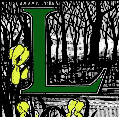 andscapes often serve as metaphors in Charles Dickens's Great Expectations. A dirty city reflects the deceit of its residents A storm foretells of an impending confrontation or revelation. In the passage below, the flatness and opacity of Pip's “windy marsh view" strike him as similar to the flat, misty future Pip envisions for himself. Pip muses on this image during the period of his adolescence in which he is apprenticed to his brother in law, Joe. He has been given a taste of upper-class life while visiting the estate of Miss Havisham, and he develops great expectations of life as a gentleman, married to her adopted daughter, Estella. His apprenticeship as a blacksmith is thus a dismal disappointment. Pip will eventually realize his dream of wealth when an anonymous benefactor gives him large sums of money, but at this point, he foresees a life of labor and modest wealth, just like Joe's.
andscapes often serve as metaphors in Charles Dickens's Great Expectations. A dirty city reflects the deceit of its residents A storm foretells of an impending confrontation or revelation. In the passage below, the flatness and opacity of Pip's “windy marsh view" strike him as similar to the flat, misty future Pip envisions for himself. Pip muses on this image during the period of his adolescence in which he is apprenticed to his brother in law, Joe. He has been given a taste of upper-class life while visiting the estate of Miss Havisham, and he develops great expectations of life as a gentleman, married to her adopted daughter, Estella. His apprenticeship as a blacksmith is thus a dismal disappointment. Pip will eventually realize his dream of wealth when an anonymous benefactor gives him large sums of money, but at this point, he foresees a life of labor and modest wealth, just like Joe's.
Pip also reflects here on Joe's merits. He claims that he kept apprenticing only out of respect for Joe. Joe is a slow, illiterate laborer, but he is kindly and diligent. This passage supports the idea that Joe is a powerful, albeit unlikely, role model for Pip.
I remember that at a later period of my “time," I used to stand about the churchyard on Sunday evenings when night was falling, comparing my own perspective with the windy marsh view, and making out some likeness between them by thinking how flat and low both were, and how on both there came an unknown way and a dark mist and then the sea. I was quite as dejected on the first working-day of my apprenticeship as in that after-time; but I am glad to know that I never breathed a murmur to Joe while my indentures lasted. It is about the only thing I am glad to know of myself in that connection.
For, though it includes what I proceed to add, all the merit of what I proceed to add was Joe's. It was not because I was faithful, but because Joe was faithful, that I never ran away and went for a soldier or a sailor. It was not because I had a strong sense of the virtue of industry, but because Joe had a strong sense of the virtue of industry, that I worked with tolerable zeal against the grain. It is not possible to know how far the influence of any amiable honest-hearted duty-doing man flies out into the world; but it is very possible to know how it has touched one's self in going by, and I know right well, that any good that intermixed itself with my apprenticeship came of plain contented Joe, and not of restlessly aspiring discontented me. [p. 87]
Questions
What is meant by Pip's claim that the influence of Joe's character on him is not possible to measure? Does Dickens favor the idea that people do not directly influence one another, but rather touch one anothers' souls in passing?
What does Dickens gain by having Pip narrate the story in retrospect? Does Pip recall these events with the same sense of guilt he felt while living through them?
As evidenced by this passage, what is Pip's view of loyalty?
References
Dickens, Charles. Great Expectations. Ed. Edgar Rosenberg. New York: W.W. Norton, 1999.
Last modified 16 February 2004
Last modified 8 June 2007